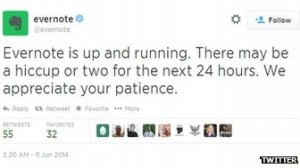By Leo Kelion Technology desk editor
 |
||
| Evernote has emerged as one of the most popular cloud-based storage services |
“The attacker is trying to extort us money to make it stop,” representatives of the company, which has 15 million users, said in a blog post.
“We refused to give in,” they added.
On Tuesday, the popular online notes and web clippings service Evernote suffered a similar attack.
It is not yet known whether the two are linked, but Feedly and Evernote work closely together.
After coming under attack earlier on Wednesday, Feedly assured users their data was safe, and said it was working with its network provider to remove the threat.
On Tuesday, Evernote members were temporarily unable to synchronise their notes from one device to another while it continued.
The California-based company announced last month that it had more than 100 million users.
Distributed denial of service (DDoS) attacks are caused by what can be thousands of computers sending huge amounts of data to a target’s servers in an effort to overwhelm them.
This sometimes involves hijacked PCs – whose owners may be unaware of their involvement – in what is known as a botnet.

This is not the first time Evernote has been compromised. In 2013 it said hackers had managed to access user names, email addresses and encrypted passwords.
However, it appears that the latest cyber-assault is more limited.
Spokeswoman Ronda Scott told the BBC that the cyber-assault, caused by an unknown perpetrator, began at 14:25 local time [22:25 BST] on Tuesday and had not yet ended.
“We continue to mitigate the effects of the attack, but have successfully returned Evernote to service,” she added.
“As is the nature of DDoS attacks, there was no data loss, and no accounts were compromised.”
